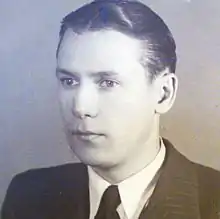Aarne Kauhanen
Aarne Emil Kauhanen (29 November 1909 – 11 October 1949)[1] was a Finnish officer of the Central Detective Police (EK) and its successor, the State Police (ValPo), with special responsibility for aliens in the 1930s and 1940s. He also acted as a liaison between the Finnish and Nazi German police authorities and was involved in the recruitment of the Finnish SS Battalion. Anti-Semitic Kauhanen was guilty of beatings and even torture during interrogations during the Continuation War. After the war, he escaped to South America, where Kauhanen died in unclear circumstances in 1949. According to a memoir, one of Kauhanen's victims recognized and later shot him.
Aarne Kauhanen | |
|---|---|
 Kauhanen in c. 1934 | |
| Birth name | Aarne Emil Kauhanen |
| Nickname(s) | Kuha |
| Born | 29 November 1909 Helsinki, Grand Duchy of Finland, Russian Empire |
| Died | 11 October 1949 (aged 39) Venezuela |
| Allegiance | |
| Service/ | Central Detective Police State Police |
| Years of service | 1933–1944 |
| Battles/wars | Winter War Continuation War |
Life
Early years
Aarne Kauhanen's parents were the merchants Antti Kauhanen and Alma Sundsten. Kauhanen attended seven classes at the Finnish Normal Lyceum in Helsinki, and continued at the Finnish Business School, where he received his diploma in 1928. Kauhanen initially worked as an office clerk in Helsinki[1] until he became an EK clerk in 1933.[2] Kauhanen, known by the code name “Kuha”, was one of Valpo's most anti-Jewish employees.[3][4]
Wartime
During the Winter War, he was transferred to supervise foreign volunteers stationed in Ostrobothnia.[5] A little later, he became the closest assistant to Arno Anthoni, who was appointed head of Valpo in March 1941. Like Kauhanen, Anthoni was pro-Nazi and anti-Semitic, as was Toivo Horelli, the interior minister who acted as their supervisor.[6]
After the outbreak of the Continuation War, Kauhanen monitored the foreigners taken into custody and the refugees in the country, also conducting their interrogations.[7] Fluent in German, Kauhanen later acted as a liaison between Valpo and the Kriegsorganisation Finnland of the German military intelligence department, making several trips to German-occupied Estonia and Latvia on Horelli's order.[8] Kauhanen also participated in the recruitment for the Finnish SS Battalion as the office manager of Insinööritoimisto Ratas, a cover organization that recruited volunteers.[9] In the summer of 1942, Kauhanen belonged to group that hosted Heinrich Himmler during his visit to Finland.[10] In 1944, Kauhanen escorted 11 deportees to Tallinn, when a Czech man reportedly died during a voyage in unclear circumstances.[5]
After the war
Shortly after the Moscow armistice was concluded in September 1944, Kauhanen fled to Sweden.[8] At the same time, fellow ValPo employees Arno Anthoni, Deputy Manager Ville Pankko, detective Arvid Ojasti and detective Erik Jaarma also fled.[11] In February 1945, Kauhanen announced that he did not intend to return to Finland for the fear of Allied Commission, where he was accused of several beatings during interrogations.[8] At the end of 1944, the Polish state had proposed to the Western Allies the addition of Horell, Anthon and Kauhanen to the list of war criminals, but for some reason the Soviet-led Monitoring Commission did not forward the request to the Finnish authorities, and thus they were not prosecuted in the war crimes trial.[12]
Kauhanen did not receive asylum from Sweden, but continued with a refugee passport issued in Stockholm to Venezuela, where several other Finns had also fled after the war. He is said to have earned his living by trading with Arvid Ojasti.[8] Kauhanen was arrested in Caracas, the capital of Venezuela, in May 1947 when he was identified in front of the US Consulate by Edgar Jakapi, an Estonian engineer who was interrogated by Valpo in Helsinki. The Venezuelan authorities interrogated Kauhanen, waiting for more information from Finland as to whether he was considered a war criminal. Jakapi accused Kauhanen of torture, and when information about the arrest arrived to Sweden, Expressen reported several Jewish refugees who said they were willing to testify against him for the beatings and torture during interrogations.[5][13] However, Kauhanen was not handed over to Finland, but he died in unclear conditions in Venezuela in October 1949.[8]
According to a memoir received by journalist Elina Sana in 1978, an Estonian man named Pikmäk would have shot Kauhanen in Argentina or Uruguay. According to the report, Kauhanen tortured Pikmäk during Valpo's interrogations, and he took revenge. It may also be possible that it was Jakapi who had just identified Kauhanen who shot him.[14]
References
- Norssit 1867–1992 : Suomalaisen Normaalilyseen, Helsingin Normaalilyseon, Helsingin I Normaalikoulun ja sen alkuvaiheiden matrikkeli, s. 214. Helsinki: Vanhat Norssit ry.; Helsingin I Normaalikoulu, 1992. ISBN 952-90363-5-3. Teoksen verkkoversio (PDF).
- Westerlund, Lars: Itsetehostuksesta nöyryyteen : suomensaksalaiset 1933–46, s. 218–219. Helsinki: Kansallisarkisto, 2011. ISBN 978-951-53337-3-5. Teoksen verkkoversio Archived 2020-09-23 at the Wayback Machine (PDF).
- Westerlund, Lars: Cirkus Collani : de finländska SS-frivilliga 1941–43 : en sedesskildring baserad på de frivilligas egna berättelser, s. 166. Helsinki: Books on Demand, 2017. ISBN 978-951-568-964-1.
- Hanski, Jari: Juutalaisviha Suomessa 1918–1944, s. 161. Helsinki: Ajatus, 2006. ISBN 951-20704-1-3.
- Palautetaan Venezuelasta Suomeen sotarikollisena?. Helsingin Sanomat, 17.5.1947, s. 5. HS Aikakone (vain tilaajille) Viitattu 18.10.2018.
- Sana, Elina: Kuoleman laiva S/S Hohenhörn : juutalaispakolaisten kohtalo Suomessa, s. 241. Helsinki: WSOY, 2004 (1. painos 1979). ISBN 951-02921-8-4.
- Sana, Elina: Luovutetut : Suomen ihmisluovutukset Gestapolle, s. 161. Helsinki: WSOY, 2003. ISBN 951-02797-5-7.
- Silvennoinen, Oula: Salaiset aseveljet : Suomen ja Saksan turvallisuuspoliisiyhteistyö 1933–1944, s. 306, 319. Helsinki: Otava, 2008. ISBN 978-951-12150-1-1.
- Sana 2004, s. 52.
- Sana 2004, s. 79.
- Westerlund 2011, s. 268–269.
- Sana 2004, s. 10, 243.
- Järkyttäviä kertomuksia Kauhasen pahoinpitelyistä. Helsingin Sanomat, 23.5.1947, s. 5. HS Aikakone (vain tilaajille) Viitattu 18.10.2018.
- Sana 2004, s. 243–244.